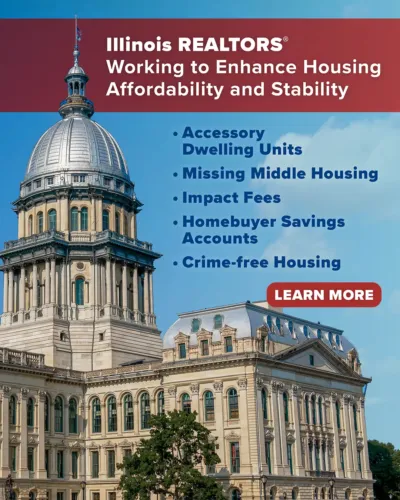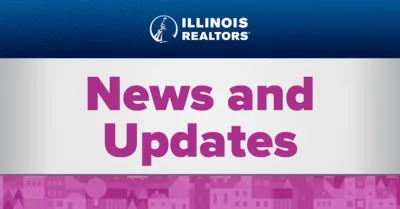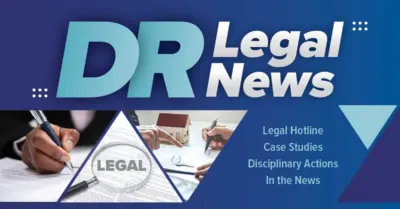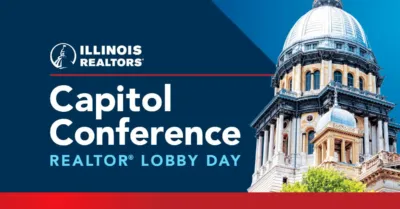Legal Case Studies: Market Value Paid for Goods & Services? Then RESPA OK
Legal case studies this issue: Section 8 & RESPA, appraiser license revocation, reasonable accommodations (fair housing), and commercial lease option requires strict notice compliance
Research and analysis by Lisa Harms Hartzler,
Sorling Northrup Attorneys
Referral arrangements do not violate RESPA if market value is paid for goods or services
In PHH Corp. v. Consumer Financial Protection Bureau, 881 F.3d 75 (D.C. Cir. 2018), a federal court of appeals reinstated a 2016 decision interpreting the Real Estate Settlement Procedures Act of 1974 (RESPA). This case involved PHH’s mortgage insurance and reinsurance arrangements when it acted as a mortgage lender. Mortgage lenders often require riskier borrowers to purchase mortgage insurance to protect them if the borrowers default. Mortgage insurers may, in turn, obtain reinsurance to transfer some of their risk in exchange for a portion of the borrower’s monthly insurance premiums. Borrowers do not generally shop for mortgage insurance or reinsurance. They typically accept a referral made by their lender. In this case, the only mortgage reinsurers in the market were “captive,” meaning they existed only to reinsure loans originated by the mortgage lenders that owned them. Thus, the mortgage lender arranged to refer borrowers to a mortgage insurer who would in turn use the lender’s captive reinsurer and thereby participate in a portion of the borrowers’ insurance payments.
The court explained that one of the purposes of RESPA was to eliminate “kickbacks or referral fees,” which tended to increase unnecessarily the costs of real estate settlement services. Section 8(a) prohibited giving or accepting “any fee, kickback, or thing of value pursuant to any agreement or understanding” to refer business involving a settlement service. “Thing of value” was defined broadly to include participating in a money-making program. However, Section 8(c)(2) stated that nothing in the statute “shall be construed as prohibiting…payment for goods or facilities actually furnished or for services actually performed.”
According to the CFPB Director, any payments to PHH’s captive reinsurance company always violated RESPA because they were tied to the mortgage lender’s referral to the primary insurer, even if the reinsurance premiums were reasonably related to the value of the reinsurance provided. The court in its 2016 opinion disagreed, stating that RESPA clearly excepted bona fide payments from the referral fee prohibition. “A payment for a service pursuant to a tying arrangement does not make the payment any less bona fide, so long as the payment for the service reflects reasonable market value.”
In this case, the court revisited the 2016 decision primarily to hold that the CFPB’s organizational structure did not violate the U.S. Constitution. It also importantly reinstated the prior holding that Section 8 does not prohibit payments tied to referrals if goods and services are actually provided and reasonable market value is paid for them.
Better Business Bureau rating is protected by First Amendment
In Perfect Choice Exteriors, LLC v. Better Business Bureau of Central Illinois, Inc., 2018 IL App (3d) 150864, an Illinois appellate court reviewed the dismissal of a defamation suit against the Better Business Bureau. The plaintiff, a home improvement company specializing in roofing, windows, and siding, sued the Bureau for demoting it from an “A” to a “D-” rating and allegedly telling customers who called the Bureau that the plaintiff was a “bad company” and not to do business with it. The Bureau asked the court to dismiss the case because the allegedly defamatory statements were protected as free speech under the First Amendment to the U.S. Constitution.
To state a valid claim for defamation, a plaintiff must offer facts showing that the defendant made a false statement about the plaintiff, which was published to a third person, and which caused harm to the plaintiff. A defamatory statement harms a person’s reputation to the extent it lowers the person in the eyes of the community or deters the community from association with that person. Five categories of statements are defamatory on their face (or per se) in Illinois, which include words that impute that a person (1) has committed a crime; (2) is infected with a loathsome communicable disease; (3) is unable to perform or lacks integrity in performing the person’s employment duties; (4) lacks ability or otherwise prejudices that person in a profession; and (5) has engaged in adultery or fornication.
A per se defamatory statement may not be actionable in court if it enjoys protection under the First Amendment as an expression of an opinion that does not state or imply an assertion of fact that is provably false. A defendant can assert this First Amendment protection when sued for defamation by a public official or a public figure or by a private individual when the defendant is the media. As the court acknowledged, the Illinois Supreme Court has not yet determined whether this protection may be asserted when a private party has allegedly defamed another private party on a matter of public or private concern. The appellate court in this case decided that First Amendment protection does apply.
According to the appellate court, the test for determining whether a statement is protected from a defamation claim under the First Amendment is whether it can reasonably be interpreted as stating actual fact—whether it has a precise and readily understood meaning, is verifiable, and signals factual content by its literary or social context. In this case, a majority of the court found that the Bureau’s website and pamphlet describing its rating system were “pure expressions of opinion” and could not be verified or proved false. It held that the Bureau was protected by the First Amendment.
The dissenting judge in this case argued that First Amendment protections should not be available in this case. First, a “D minus” rating was defamatory per se because it imputed to the plaintiff a lack of ability or willingness to carry out its business functions and prejudiced its profession. Further, because the Bureau expressly declared in its pamphlet and on its website that its rating was based on factual information about the plaintiff in numerous categories, which were collected and filtered through a “proprietary formula” to reach a stated grade, it implied that the rating was an expression of opinion based on a foundation of fact and capable of being proven false. Nevertheless, the dissent was only one voice. The majority dismissed the case.
Due Process denied to appraiser in license revocation
In Engle v. Department of Financial and Professional Regulation, 2018 IL App (1st) 162602, an Illinois appellate court reviewed a decision by the Illinois Department of Financial and Professional Regulation (Department) to revoke the plaintiff’s professional appraiser license because she allegedly falsified the number of training hours claimed on her application. The plaintiff sought administrative review in circuit court, which upheld the Department’s revocation. The plaintiff then appealed that decision, claiming a denial of due process.
The court determined that a “professional license constitutes a property interest entitled to due process protections” and that due process standards apply to proceedings to revoke a professional license. An administrative hearing will generally comply with due process when the party is given the opportunity to be heard, the right to cross-examine adverse witnesses, and an impartial ruling based on the evidence. The procedural process that is due is a flexible concept and is analyzed by considering (1) the private interest that will be affected by the agency action; (2) the risk of an erroneous deprivation of such interest and the value of additional procedural safeguards; and (3) the agency’s interest, including the burdens that additional procedural safeguards would entail.
In this case, the plaintiff failed to meet the deadline for filing answer to the Department’s complaint, causing the administrative law judge to enter a default order. Generally, due process is not violated in an administrative proceeding when the negligence or intentional conduct of a party results in the entry of a default judgment. However, unlike prior cases upholding such default judgments, the court in this case found that the Department did not follow its own procedures and the plaintiff was not negligently or intentionally at fault. The Department (which had the burden to prove its allegations) failed to file a motion to request that the plaintiff’s failure to file an answer be deemed an admission of the truth of the complaint, the plaintiff had several motions pending that were never ruled on, and a hearing on the merits was never scheduled despite the plaintiff’s pending motions. The plaintiff also had cause for her failure to file a timely answer, which included the death of her attorney, the resulting dissolution of the law firm handling her case, and the consequent difficulties subsequent attorneys had in sorting out and attending to multiple pending cases.
The court held that the plaintiff had been denied due process because an appraiser’s license is a property right entitled to procedural due process; there was significant risk that plaintiff’s license was revoked erroneously due to the lack of a hearing and other procedural failures; and allowing the plaintiff to present evidence and cross-examine witnesses in this case would not have imposed additional administrative or fiscal burdens on the Department. The court reversed the Department’s revocation of the plaintiff’s license and remanded the case to the administrative law judge for a hearing on the merits.
Granting Conditional Use Permit would be a reasonable accommodation to group home for disabled individuals
In Valencia v. City of Springfield, — F.3d – (7th Cir. 2018), 2018 U.S. App. LEXIS 5161, 2018 WL 1095954, the federal appeals court for the Seventh Circuit upheld a district court’s injunction prohibiting eviction proceedings initiated by the City of Springfield against a group home for disabled individuals. The plaintiffs were three disabled individuals who rented a single-family house staffed by Individual Advocacy Group, Inc. (IAG), a non-profit organization providing residential services to adults with disabilities, including assistance in dressing, food preparation, shopping, home maintenance, and cleaning. The court noted that such services allow disabled individuals to live in family-like settings in typical residential communities. IAG facilitated locating suitable places for group homes, which it did for the plaintiffs in this case.
Unbeknownst to IAG, the home it had located, arranged for the plaintiffs to rent, and remodeled to make it suitably accessible, was across the street from another family care residence operated by a different organization supporting those with developmental disabilities. After receiving a complaint, the City notified the plaintiffs and IAG that the home violated City zoning ordinances prohibiting the location of a “family care residence” less than 600 feet from another such facility. The City said the residents would be evicted unless they obtained a “Conditional Permitted Use (“CPU”) for the home. A CPU required an applicant to establish a lack of adverse effects upon nearby facilities and existing privacy, light or environment of surrounding residences. The owner and residents applied for a CPU but were denied by the zoning and planning commission and the City Council based upon an insufficient showing of minimal detrimental impact on the surrounding area.
The plaintiffs filed suit against the City and requested a preliminary injunction against the eviction proceedings, claiming the City discriminated against them in violation of the Fair Housing Act (adding protections to persons with disabilities in 1988), the Americans with Disabilities Act, and the Rehabilitation Act of 1973. All three acts apply to municipal zoning decisions. A plaintiff may prove a violation of each by showing (1) disparate treatment; (2) disparate impact; or (3) a refusal to make a reasonable accommodation. The appellate court affirmed the preliminary injunction awarded by the lower court because the plaintiffs demonstrated a likelihood of success on their claim that the City refused to make a reasonable accommodation by granting their CPU application.
The Fair Housing Act requires accommodation if it is reasonable and necessary to afford a handicapped person the equal opportunity to use and enjoy a dwelling. “In the context of a zoning waiver, ‘equal opportunity’ means the opportunity to choose to live in a residential neighborhood.” The burden is on the plaintiff to show that the accommodation sought is reasonable on its face. Then the defendant must demonstrate that it is unreasonable. “An accommodation is unreasonable if it imposes undue financial or administrative burdens or requires a fundamental alteration in the nature of the program.”
The court found that the CPU request was reasonable in this case. It would give the plaintiffs the opportunity to live in a residential neighborhood and advance the integration of disabled individuals into the community. The burden on the City was negligible—no additional City services, including police and emergency services, were needed or requested and there had been “no issues” with the home in the three years since it opened. Further, the City’s traffic engineer did not object to the home, the court considered neighbors’ concerns about IAG staff making noise and causing parking problems to be “entirely speculative,” and there had been virtually no interaction between the residents of the home and those across the street to cause any adverse impact.
Because there was a “better than negligible” likelihood of success on the merits of the plaintiffs’ reasonable accommodation claim, the court upheld the preliminary injunction against the City.
Exercise of commercial lease option requires strict notice compliance
In Michigan Wacker Associates, LLC v. Casdan, Inc., 2018 IL App (1st) 171222, an Illinois appellate court was asked to determine whether a restaurant tenant had adequately exercised an option to renew its commercial lease in a downtown Chicago building. A ten-year lease, entered into in 2001, provided for two extensions of five years, which could be exercised in writing by the tenant and sent by registered or certified mail. In 2010, the tenant timely exercised the first option in writing, sent by FedEx. The landlord did not object to the method of delivery nor did it dispute that the tenant effectively exercised the first option to extend.
The parties continued to negotiate the rent amount for the extension, however, and in 2012 the tenant, through his attorney, sent the landlord an email stating that tenant “would like to discuss reaching an agreement for the rent amount” and improvements tenant would like to make, that tenant “would propose” landlord match contributions for improvements, and that “tenant would like to resolve” other issues, which included that “Tenant would like to exercise the second option now so we don’t have to do this again as soon.” The email requested landlord to contact the attorney “to discuss the tenant’s proposal.” No other written notice of exercising the second option was ever made prior to the deadline for doing so in 2015.
The question for the court was whether the email effectively exercised the second option to extend the lease. The tenant claimed the email was adequate; the landlord disagreed. The court found the seminal decision on lease options, an Illinois Supreme Court case from 1900 called Dikeman v. Sunday Creek Coal Co., to be controlling. “Since Dikeman, courts have generally required strict compliance with options.” The nature of commercial transactions requires strict compliance to be fair:
Options to cancel or extend commercial leases are invaluable to a lessee, and a lessor generally does not receive consideration for the lessor’s agreement to be bound by an exercise of the option. Thus, a lessor may insist on a writing to further certainty as the lessor forgoes other opportunities to lease the space. Courts have also recognized that a lessee should be strictly held to the agreed terms because the parties to commercial leases are usually sophisticated.
Although actual or oral notice can be sufficient outside the options context, it is not adequate to exercise an option. In any event, the court dismissed plaintiff’s assertion that the 2012 email constituted actual notice. The court found that the proposal email did not constitute an effective exercise of the second option. “The acceptance of an offer contained in an option must be specific, certain, and unconditional.” At best, the exercise of the option was equivocal because it appeared to be part of a larger plan involving rent amount and improvements that were up for discussion. Tenant failed to exercise the second option.
About the writer: Kelli Jessup is a Digital Content & Marketing Specialist with Illinois REALTORS®.













